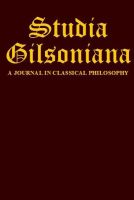The Flexibility of Thomistic Metaphysical Principles: Byzantine Thomists, Personalist Thomists, and Jacques Maritain
The Flexibility of Thomistic Metaphysical Principles: Byzantine Thomists, Personalist Thomists, and Jacques Maritain
Author(s): Mark K. SpencerSubject(s): History of Philosophy, Philosophical Traditions
Published by: International Étienne Gilson Society
Keywords: thomism; Thomas Aquinas; Gregory Palamas; Karol Wojtyła; Jacques Maritain; divine action; divine simplicity; essence-energies distinction; subjectivity; personalism; metaphysics
Summary/Abstract: Thomistic metaphysics has been challenged on the grounds that its principles are inconsistent with our experiences of divine action and of our own subjectivity. Challenges of this sort have been raised by Eastern Christian thinkers in the school of Gregory Palamas and by contemporary Personalists; they propose alternative metaphysics to explain these experiences. Against these objections and against those Thomists who hold that Thomas Aquinas’ claims exclude Byzantine and Personalist metaphysics, I argue that Thomas’ metaphysical principles already have “flexibility” built into them, such that they can accommodate ways that reality is given in experience, which Thomas did not consider. I argue for this claim using the work of Byzantine and Personalist Thomists, and especially of Jacques Maritain, who outlines several ways in which Thomistic metaphysical principles can be expanded to explain experiences that he did not consider.
Journal: Studia Gilsoniana
- Issue Year: 11/2022
- Issue No: 3
- Page Range: 445-470
- Page Count: 26
- Language: English

